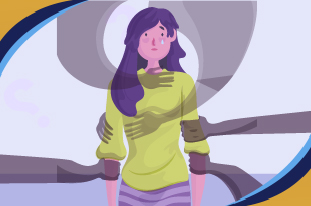The Flight and Fear Response
As an evolutionary advantage in humans for their survival as a species, a flight and fear response exists.
How The Developing Brain Is Affected By Trauma
When a child experiences a traumatic event, the brain will change the way it works for its continued sustenance. The brain will create new hard wiring and the ways it communicates with the body once trauma affects it.
Trauma in Adulthood
Trauma is not exclusive to childhood. We as adults can also experience extreme trauma, even from something like committed relationships or the sudden absence of it.
Are The Changes in The Brain Structure Permanent?
Experts believe though these effects are definitely treatable through certain treatment methods such as the Cognitive Behavioral Therapy (CBT) or the Eye Movement Desensitization and Reprocessing (EMDR) Therapy.
Treatment Methods For PTSD
Psychotherapy and Medications are excellent for treating a mental condition like PTSD.
Trauma during the brain’s development phase, especially when someone is a fetus can significantly affect how it is fully developed before adulthood. Trauma specifically during the childhood years can also significantly affect the brain, especially in the context of trauma brain vs normal brain. Trauma in adulthood is also highly consequential. Suffice to trauma has the power to change our lives to the extent where we can actually end up suffering from certain mental disorders that can turn our lives upside down. Let’s talk about it some more:
The Flight and Fear Response
As an evolutionary advantage in humans for their survival as a species, a flight and fear response exists. In a neurotypical brain, an impending danger means that it is time to take flight or fight the danger. But in the trauma brain vs normal brain, the same response is impaired due to a past trauma, which acts as a constant trigger for post traumatic stress, developing into Post Traumatic Stress Disorder (PTSD). We will talk about PTSD, but we’ll first talk about how something that was supposed to be a normal brain transforms into a trauma brain.
Learn More: The Hidden Mental Scars of Childhood Trauma in Adults
How The Developing Brain Is Affected By Trauma
There is a reason we sometimes debate a topic like childhood trauma brain vs normal brain as brain development starts as early as a child’s conception in a mother’s belly. Even if the mother feels trauma, no matter what kind it is, the child’s brain even at the fetus stage will be affected. This is because a child’s brain, before he or she reaches adulthood, is always evolving in the developing sense. The first eight weeks of someone’s life is perhaps one of the most important times of their life when it comes to development. During this time, their care is paramount and an adult caregiver is important, be it a parent or guardian who is present at all times, trustworthy and caring.
When a child experiences a traumatic event, the brain will change the way it works for its continued sustenance. The brain will create new hard wiring and the ways it communicates with the body once trauma affects it. Trauma can be caused by physical or mental abuse, accidents, the death of someone close, or witnessing something life-threatening for someone else or yourself. Physical abuse or mental abuse is a common cause when it comes to the trauma brain vs the normal brain. Just like the nurturing caregiving of a child by a primary caregiver can greatly induce normal brain development while trauma, which is the exact opposite of it, can significantly impair the brain.
Learn More: Understanding The Different Types Of Trauma
Trauma in Adulthood
Trauma is not exclusive to childhood. We as adults can also experience extreme trauma, even from something like committed relationships or the sudden absence of it. While the brain is no longer in development, it never stays plastic because it can change as a response to different events, especially when it is traumatic. Exposure to trauma can affect brain function in healthy people several years after a traumatic event. It also makes them more susceptible to mental conditions such as PTSD.
The trauma brain vs normal brain is so affected so much that a condition like PTSD, which is all about the constant stress of past trauma once it is triggered, comes into existence. It usually shows its symptoms during adulthood and can comprise of:
- Having problems with emotion
- Greater fear response, which is also difficult to let go
- Are unable to relax
- Bad memory and problems focusing
- Having problems differentiating the past from the present
- Having no interest and unrelenting depression
Trauma Brain vs Healthy Brain: The Differences
What are the differences when it comes to the topic that relates to the debate of trauma brain vs normal brain? Once trauma or something like PTSD affects the brain, do the internal structures of the brain also change? Exposure to high-intensity traumas can have long-lasting effects on the brain and behavior of healthy people, which also lead to changes in the structures of the brain. PTSD can especially change both your brain’s physical structure and its functions. Here’s how:
- The Amygdala becomes overactive and the ventromedial prefrontal cortex becomes underactive. It would make sense since the amygdala is the “fear center” of the brain and the aforementioned cortex is tasked with regulating the amygdala and its fear response
- The gray matter in the prefrontal cortex is reduced. It is the dark tissue that is mostly present as the outer layer of the brain and is where most of the decision-making and information-processing process takes place
- Gray and white matter in the cerebellum are also significantly reduced. While the white matter is the part that connects different parts of the brain with each other, the cerebellum is the part that is located at the back of the brain and is tasked with handling motor skills, balance, emotions, and memory
- Creates abnormalities in the western hemisphere of the hippocampus and amygdala. The hippocampus deals with new memory creation and spatial navigation, explaining memory problems as a symptom of PTSD
- People with PTSD evidence reduced reactivity in neural areas associated with the reward system, which leads to lower reward satisfaction, and reduced dopamine levels
Learn More: Understanding Relational Trauma
Are These Changes in The Brain Structure Permanent?
Experts have no idea if the effects of trauma or PTSD are reversible. They do believe though, that these effects are definitely treatable through certain treatment methods such as Cognitive Behavioral Therapy (CBT) or the Eye Movement Desensitization and Reprocessing (EMDR) Therapy. Studies have shown that CBT promises strong results, especially in regards to social anxiety disorder which can occur as a result of long exposure to PTSD. The amygdala had gotten smaller in the people who were treated with CBT. EMDR also measured positive results when treating PTSD. All of this evidence suggests that brain structure tends to change when good treatment methods like CBT are applied to the affected individual, closing the debate of trauma brain vs normal brain.

Treatment Methods For PTSD in Detail
There are a couple of treatment methods that can help in resolving the issue of trauma brain vs healthy brain. The most effective ones are psychotherapies like CBT or medication. Let’s talk about them a little to finally put a pin into the matters relating to trauma brain vs normal brain.
Psychotherapy: Also called “Talk” therapy, where patients talk to mental health experts to ensure they can find resolutions to their problems together. Cognitive Behavioral Therapy (CBT), which involves homework, or Eye Movement Desensitization and Reprocessing (EMDR) Therapy, which involves moving your eyes a specific way while you process traumatic memories, are both examples of psychotherapies.
Medication: Medication like antidepressants can treat symptoms like depression or stress that are also associated with a disorder like PTSD. On the other end, medication like anti-anxiety medicines can help reduce the extreme anxiety also associated with PTSD.
Conclusion
Now that the debate of trauma brain vs normal brain might be abating for you by reading this blog, you can put your focus on the actual treatment of PTSD. For that, we at Orange Coast Psychiatry can provide you with a mental health professional who can essentially treat your PTSD or other trauma-related problems. We are also adept at treating Acute Stress Disorder, Adjustment Disorders, Dissociative Disorders, Psychosis, Mood Disorders, or an Eating Disorder, in addition to Telehealth and Psychiatric Medication Management services.


















